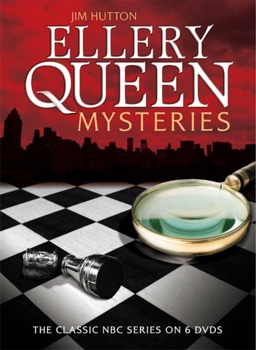


NAAR PAGINA: 1 • 2 • 3 • 4 • 5 • 6 • 7 • 8 • 9 • 10 • 11 • 12 |
![]()
|
Dale C. Andrews
For those who do not read every letter on every page of this
site, let me introduce you to
my
friend
Dale C. Andrews.
What started out as a common interest has turned into a
friendship. (So
since you ask:
yes I'm biased).
Our early
discussions on Ellery Queen
works
and themes blossomed into Dale authoring
two EQMM publications.
Both of them,
"The Book Case" and "The
Mad Hatter's Riddle" are Ellery Queen
pastiches. On occasion Dale also writes for Criminal Brief
and
to this day
I value his thoughts on
everything relating to Ellery, including matters addressed
on
this site. It is my firm belief that Dale has more whodunits
in his pen and it's only a matter of time before we
all
will be able to enjoy them. Even more so since, totally in
tune with the concept of the West 87th Street Irregulars,
Dale retired from his job as a government attorney last
year.
About one year ago Dale wrote an article on the NBC
Ellery
Queen series, which appeared on-line in Criminal Briefs, to
accompany the publication of his story "The Mad Hatter's
Riddle," an Ellery Queen pastiche involving the
filming of one of the NBC episodes,
"The Mad Hatter's Tea Party", based on an Ellery
Queen short story.
Given his keen interest in the series
it came as no surprise to me that Dale's entry into the West
87th Street Irregulars is occasioned by
this re-worked article in light of the imminent release
of the re-mastered boxed DVD edition of the series.
Like so many of the American Ellery Queen fans, all of whom tend to have reached a somewhat mature age (see also Joseph Goodrich), we all tend to think back with a deep nostalgic sigh when it comes to the 1975 TV series Ellery Queen. Each of us has been guilty, from time to time, of one or all of the following:
- saying
they don't make detective shows anymore like they
used to - saying how we appreciated Jim Hutton's take on Ellery in comparison to the overconfident, know-it-all in the first books - saying how great Elmer Bernstein’s score for the series was and then humming it out loud (in Dale's case: playing it on the piano!) - buying a dodgy copy of the series on eBay and then groaning through the grainy images - telling each other how great it would be if someone (anyone) would arrange for an official release of the whole series (and while they're at it if they could please would not forget the pilot and not cut out anything, like....) That will now end shortly... and then all of you (young and old) can attest to the fact that we aging fans of the series were right all along. Since you're reading this I'm deducing you are already fans or potential fans. So I hope you can help to bring the series to the attention of the youngsters. - Who knows they might even realize there are still a few books lying around waiting to be (re)published. Kurt Sercu |


|
WHEN ELLERY QUEEN MET NBC -
Satire, it is said, closes on Saturday nights. In an article
published some years back in the San Francisco Weekly
reflecting on the spotty career of satirist
Tom Lehrer,
Jack Boulware offered the following explanation of the truth
underlying the cliché: “satire never makes any money and
people don’t understand it.”
A true corollary to satire’s epitaph
is the fate of the televised mystery short story. A smartly
written television mystery series, particularly a whodunit,
rarely lasts more than a season. And forget about
anthologies – other than Alfred
Hitchcock and
The Twilight Zone
they invariably cave in a few weeks. The success of
classical mysteries on the airwaves it has been observed,
like the success of satire, is directly and inversely
correlated to the intellectual effort demanded from the
viewers.
I know, I know. You will point to the many CSIs and
Law and
Orders that seem to grind on forever. Or you will
remind me that Murder She Wrote lasted for 12 seasons. But comparing
classic mysteries, particularly “fair play” intellectual
brain-teasers, to those admittedly successful series is, I
would posit, like comparing Milton Berle to Tom Lehrer. It
is not Burlesque that closes in a week – it’s satire.
Two paragraphs back I was tempted to state that smartly
written television mysteries rarely last more than 13 weeks,
but that would have been historically at least a bit unfair.
One of the finest whodunits ever developed for television in
fact lasted a full season.
NBC’s 1975 - 1976
Ellery Queen
series was developed for television by Richard Levinson and
William Link, of Columbo fame. They approached the series
with both a love and an understanding of the Queen oeuvre.
Earlier Queen movies and television series simply could not
get the tone right. They tended to lessen the intricacy of
the Queen plots while at the same time re-inventing Ellery
into a humorous or even slapstick foil. An earlier NBC pilot
for an Ellery Queen series went so far as
to surrealistically and disastrously handed over Ellery’s
role to Peter Lawford, who played him as a “mod” Brit.
Levinson and Link had been behind that effort originally,
but as they watched the pilot develop they insisted that
their names be removed from the final version, which aired
as a two hour movie on NBC.
Levinson and Link, by all accounts
lifelong Queen fans, were given free hand that time by NBC
to do Ellery Queen
the way they wanted.
The
producers anchored the series in 1947 and set a stylistic
tone in keeping with the Queen works of the 1940s. The late
Jim Hutton captured Ellery magnificently as a good-natured,
absent-minded young man – a character who more neatly
matched the Ellery of the 1940s heyday of the series (as
contrasted to the pince-nez dandy from the earlier Queen
volumes).
While the absent minded nature of
Ellery was in many respects itself re-invention, it was
re-invention that worked because it did not stray
impermissibly from the original. In
an earlier article that I wrote for Criminal Briefs I
addressed the problems faced by someone trying to write
about a character created by others.
(I wrestle with these problems
myself whenever I get the opportunity to write
Ellery Queen pastiches, as I did with Kurt in “The
Book Case” and then again on my own in “The Mad
Hatter’s Riddle”.)
In that earlier article I
offered the following rule that I apply when utilizing a
character created by others – like the physician, I “try
first to do no harm.” There are leeways that can be taken
with an existing character, but at the end of the story the
character should remain recognizable. The pastiche writer
owes this, I believe, to the original character and author.
The befuddled and clumsy Ellery
of the movies failed this test, I believe –
the
character was played too broadly; Ellery was transformed
into a burlesque of the original. But, by contrast, the
absent minded Ellery created by Mr. Hutton, and as
envisioned by Levinson and Link, evolved a bit but still
rang completely true.
In the 11 October 1975 issue of TV Guide, published the week
that the NBC series premiered, Rand Lee, a son of Manfred B.
Lee who was half of the duo behind the Queen volumes, made
precisely this point:
So, too, the show captured the Inspector, even though it
dropped the “Old Man’s” trademark mustache. Hutton’s charm
and natural manner played perfectly against David Wayne’s
crusty Richard Queen, and a more perfect Sergeant Velie than
that delivered by Tom Reese is hard to imagine.
But while each of these ingredients was necessary to the
show’s critical (if not commercial) success, it was the
caliber of the whodunit mysteries that were the hallmark of
the series. Though the episodes varied in quality, each was
ultimately redeemed by its plot, the production values, and
the marvelous cast. The stories were also
perhaps the best televised approach to classic “fair play”
detective short stories ever brought to the television
screen. All of the clues were meticulously displayed for the
viewer – the camera, in fact, would often linger on the
critical clue for a long moment, daring us to figure out its
significance – and when Ellery invariably turned to the
screen three-quarters of the way through each episode to
offer up his “challenge to the reader” we had only ourselves
to blame if (when!) we still could not decipher the truth
that Mr. Queen had just gleaned.
So why did this erudite, stylistic and highly praised series
last but one year? Hearkening back to the beginning of this
discussion, I think it is the same reason that satire closes
in a week. The show was, too good, it demanded more than the
television audience was willing to commit.
In a 2002 article "Confessions
of a Mystery Writer" William
Link concluded as much. " Thinking back,” he wrote, “the
Queen
series was too complicated for its own good. I remember
spending an entire afternoon with Dick [Levinson] trying to
figure how keys on a keychain would fall into what
configuration in one’s pocket when placed there. When
audiences didn’t respond the lesson was learned: "[o]ur
failure with Ellery
Queen was our
template” for future efforts, Levinson observed.
We
deliberately made the clues on
Murder She Wrote easier to
decipher, including a very guessable murderer now and then.
Part of our psychology was to reward the focused viewers
because they might then be motivated to return the following
week. Another unexpressed reason was that it was far easier
to come up with facile clues than sweating bullets over keys
in a pocket… The upshot was that ‘Murder
She Wrote‘ thrived for 12
seasons, Ellery Queen
[only] one.
In short, the
Queen
show simply refused to write to a least common denominator.
It played to a higher appreciation level.
And like good satire, which
closes on Saturday night, that ultimately proved its
undoing.
The
series closed in 1976. |
||
 |
Short of catching an errant re-run of
Ellery Queen,
the series, like much of Queen’s written work, has in recent
years been largely unavailable. But all of that is about to
change!
The explosion of the DVD market
has provided an outlet for many short-lived but highly
commendable series.
And, by the same token, these
series have proven commercially feasible even if they do not
play to a lowest denominator.
The DVD and the array of cable
networks now available have changed entertainment marketing.
A series, to sell successfully,
can now appeal to a niche market in a way that could have
never happened in the mid-1970s.
|
|
|
And so, thankfully and at long last,
it is not Mr. Queen’s turn to step up to the plate.
As Kurt has noted in recent
posts, and in the introduction to this piece, the entire
1975 - 1976 NBC
Ellery Queen
series will be available as of the
end of September in a boxed set of DVDs.
The series is a wonderful collection
of tightly produced who-dunnits.
Highly anticipated, and highly
commended to all!
©
Original
text
2009,
revision 2010
Dale C. Andrews.
Used by permission
Other articles by
this West 87nd Street Irregular
Page first published on September
1. 2010
|
||
|
||

|
|
| Inleiding | Plattegrond | Q.B.I. | Liist Verdachten | Wie? | Q.E.D.
| Moord en
scene | Nieuw |
Auteursrecht Copyright © MCMXCIX-MMXXVI Ellery Queen, een website rond deductie. Alle rechten voorbehouden. |